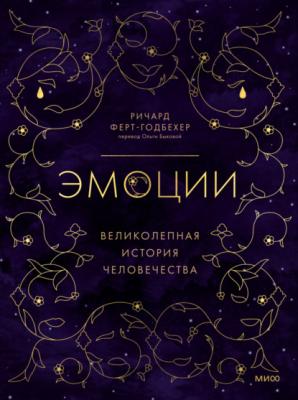Эмоции: великолепная история человечества. Ричард Ферт-Годбехер
Читать онлайн.| Название | Эмоции: великолепная история человечества |
|---|---|
| Автор произведения | Ричард Ферт-Годбехер |
| Жанр | |
| Серия | МИФ Культура |
| Издательство | |
| Год выпуска | 2021 |
| isbn | 9785001956884 |
13
David Sedley, Plato’s Cratylus, Cambridge Studies in the Dialogues of Plato (Cambridge, UK: Cambridge University Press, 2003), 10.
14
Alfred North Whitehead, Process 4 Reality, ed. David Ray Griffin and Donald W. Sherburne (New York: Free Press, 1978), 39.
15
Множественное число от греч. παθóς. Здесь и далее, если не указано иное, примечания переводчика и редактора.
16
Plato, “Republic,” trans. G. M. A. Grube, rev. C. D. C. Reeve, in Plato: Complete Works, ed. John M. Cooper (Indianapolis: Hackett Publishing, 1997), loc. 26028–27301, Kindle.
17
Здесь и далее цитаты из Библии и Торы даются в русском синодальном переводе.
18
Plato, “Republic,” loc. 27176–27195.
19
Plato, “Republic,” loc. 27239–27264.
20
Xenophon, Memorabilia, trans. Amy L. Bonnette (Ithaca, NY: Cornell University Press, 2014), loc. 514–520, Kindle.
21
Plato, “Phaedo,” loc. 2889.
22
Федон // Платон. Собр. соч. в 4 т. Т. 2 / пер. С. П. Маркиша. М.: Мысль, 1993.
23
Plato, “Phaedo,” loc. 2886.
24
Plato, “Phaedo,” loc. 2878–2897.
25
Plato, “Critias,” trans. D. Clay, in Plate: Complete Works, ed. John M. Cooper (Indianapolis: Hackett Publishing, 1997), loc. 1541, Kindle; Plato, “Phaedo,” loc. 2511.
26
Plato, “Phaedo,” loc. 2890.
27
Emily Wilson, The Death of Socrates (Cambridge, MA: Harvard University Press, 2007), 114.
28
Или в оригинале: «Oh Kriton, das Leben ist eine Krankheit!» См. www.nietzschesource.org/#eKGWB/FW-340.
29
Glenn W. Most, “A Cock for Asclepius,” Classical Quarterly 43, no. 1 (1993); 26–111.
30
Xenophon, Memorabilia, loc. 2859.
31
Plutarch, Plutarch’s Lives, trans. George Long and Aubrey Stewart (London: George Ball and Sons, 1892), 3:302.
32
Хорошие аргументы в пользу этой гипотезы приведены здесь: Bente Killerich, “The Head Posture of Alexander the Great,” Acta ad archaeologiam et artium historiam pertinentia 29 (2017): 12–23.
33
Не забывайте, что историки используют приставку «псевдо» не без оснований. Но даже несмотря на то, что сама история может быть выдумкой, она все еще способна помочь нам во многом понять аристотелевский взгляд на эмоции. Прим. авт.
34
Pseudo-Callisthenes, The Romance of Alexander the Great by Pseudo-Callistbenes, trans. Albert Mugrdich Wolohojian (New York: Columbia University Press, 1969), 57.
35
Пер. Л. Егунова.
36
Aristotle, “On the Soul,” trans. J. A. Smith, in The Complete Works of Aristotle, ed. Jonathan Barnes (Princeton, NJ: Princeton University Press, 1984), 1:413a20.
37
Aristotle, “On the Soul.” 1:434a22–434bl; Aristotle, “Parts of Animals,” trans. W. Ogle, in The Complete Works of Aristotle, 1:687a24–690a10; Aristotle, “Metaphysics,” trans. W. D. Ross, in The Complete Works of Aristotle, 2:1075a16–25.
38
Aristotle, “On the Soul,” 1:424b22–425a13.
39
Aristotle, “On the Soul,” 1:1369b33.
40
Aristotle, “On the Soul,” 1:1370al.
41
Aristotle, “On the Soul,” 2:1378a30, 1380a5.
42
Aristotle, “On the Soul,” 2:1380635, 1382bl.
43
Aristotle, “On the Soul,” 2:1382a21, 1383a15.
44
Aristotle, “On the Soul,” 2:1383616–17.
45
Aristotle, “On the Soul,” 2:1385a15–1385a1.
46
Это интересно, поскольку предполагает, что Аристотель считал следствием пате не только чувства, но и поступки. Прим. авт.
47
Aristotle, “On the Soul,” 2:1385b13, 1386b10.
48
Aristotle, “On the Soul,” 2:1387b20, 1388a30.
49
Pseudo-Callisthenes, The Romance of Alexander the Great by Pseudo-Callistbenes, trans. Albert Mugrdich Wolohojian (New York: Columbia University Press, 1969), 58.
50
Здесь
